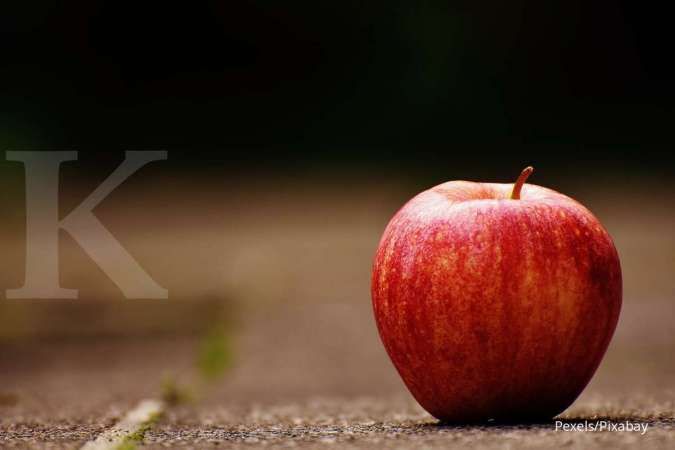KONTAN.CO.ID – You can try, a number of foods are effective in lowering blood sugar. For people with prediabetes and diabetes, diet is a major part of lowering healthy blood sugar.
Although factors, such as weight, activity, stress, and genetics, also play a role in blood sugar maintenance, following a healthy diet is essential for lowering blood sugar.
While some foods can contribute to fluctuations in blood sugar, others can optimize control or lower blood sugar while improving overall health.
Here are 10 foods that are effective in lowering blood sugar, citing: Healthline:
Also Read: Exercise to drink water, these are 7 ways to lower blood sugar naturally
1. Broccoli
This food contains sulforaphane, i.e. type isothiocyanate which has blood sugar lowering properties.
Sulforaphane is produced when broccoli is chopped or chewed due to a reaction between a glucosinolate compound called glucoraphanin and an enzyme myrosinase. Both are concentrated in broccoli.
Animal and human studies have shown that sulforaphane-rich broccoli extract has strong antidiabetic effects, helps improve insulin sensitivity, and reduces blood sugar and markers of oxidative stress.
While broccoli sprouts are a concentrated source of glucosinolates such as glucoraphanin, and have been shown to help improve insulin sensitivity and reduce blood sugar levels in people with type 2 diabetes when extracted.
The best way to increase sulforaphane availability is to enjoy raw or lightly steamed broccoli and broccoli sprouts, or add the active source. myrosinase like powdered mustard seeds to cooked broccoli.
Also Read: You can try, cinnamon is effective in lowering blood sugar
2. Pumpkin and pumpkin seeds
Brightly colored and packed with fiber and antioxidants, pumpkin is a great choice for blood sugar regulation. In fact, pumpkin is used as a traditional diabetes remedy in many countries, such as Mexico and Iran.
Pumpkin is rich in carbohydrates called polysaccharides, which have been studied for their potential in regulating blood sugar. Treatment with pumpkin extract and powder has been shown to significantly lower blood sugar levels in both human and animal studies.
However, more research is needed to determine how whole pumpkins, such as when roasted or steamed, can be beneficial for lowering blood sugar.
While pumpkin seeds are packed with healthy fats and protein, they make an excellent choice for controlling blood sugar as well.
A 2018 study of 40 people found that consuming 2 ounces or 65 grams of pumpkin seeds reduced post-meal blood sugar by 35% compared to a control group.
Also Read: 7 easy ways to lower blood sugar naturally, you can try
3. Call
Apples contain soluble fiber and plant compounds, including quercetin, chlorogenic acid, and gallic acid, all of which can help reduce blood sugar and protect against diabetes.
Although total fruit consumption has been shown to reduce the risk of diabetes, eating certain fruits, including apples, may be particularly beneficial for lowering blood sugar and reducing the risk of diabetes.
A study that included data from more than 187,000 people found that a higher intake of certain fruits, particularly blueberries, grapes, and apples, was associated with a significantly lower risk of type 2 diabetes.
Furthermore, a study in 18 women showed that eating apples 30 minutes before eating rice significantly reduced blood sugar after eating, compared to eating rice alone.
Also Read: You deserve to try, here are 4 fruits that can lower blood sugar
4. Orange
Although many oranges are sweet, research shows, this fruit can help reduce blood sugar levels. Oranges are considered a low glycemic fruit because they don’t affect blood sugar as much as other types of fruit, such as watermelon and pineapple.
Citrus fruits, such as oranges and grapefruit, are packed with fiber and contain plant compounds such as naringenin, a polyphenol that has strong antidiabetic properties.
Eating whole oranges can help improve insulin sensitivity, reduce HbA1c, and protect against the development of diabetes.
Also Read: Can lower blood sugar, seafood is a source of protein and healthy fats
5. Kale
Kale is often described as a “superfood,” packed with compounds that can help lower blood sugar levels, including fiber and antioxidant flavonoids.
A study involving 42 Japanese adults showed that eating 7 or 14 grams of kale-containing foods with high-carbohydrate foods significantly lowered blood sugar levels after meals.
Research has also shown that the antioxidant flavonoids found in kale, including quercetin and kaempferol, have strong blood sugar-lowering and insulin sensitivity effects.
Also Read: Can lower blood sugar, here are 4 benefits of dragon fruit
6. Seafood
Seafood, including fish and shellfish, offer a valuable source of protein, healthy fats, vitamins, minerals, and antioxidants that can help regulate blood sugar levels.
Protein is very important for controlling blood sugar. It helps slow digestion and prevent spikes in blood sugar after a meal, as well as increasing feelings of fullness.
Plus, protein can help prevent overeating and promote the loss of excess body fat, two effects that are important for healthy blood sugar levels.
High intakes of fatty fish, such as salmon and sardines, have been shown to help improve blood sugar regulation.
For example, a study in 68 overweight or obese adults who ate 26 ounces (750 grams) of fatty fish per week experienced significant improvements in post-meal blood sugar levels compared to those who ate lean fish.
Also Read: Effectively lowering blood sugar, here are 5 benefits of dragon fruit
7. Cinnamon
Cinnamon, a spice commonly added to sweet and savory dishes around the world, also provides many health benefits, including the ability to lower blood sugar and help manage diabetes.
A quick glance at cinnamon nutrition facts may not lead you to believe that it is a superfood. Although it doesn’t contain many vitamins or minerals, cinnamon does contain a large amount of antioxidants.
In fact, one group of scientists compared the antioxidant content of 26 different herbs and spices. They concluded that cinnamon had the second highest amount of antioxidants after cloves.
Antioxidants are important because they help the body reduce oxidative stress, a type of cell damage, caused by free radicals.
One study showed that taking 500 mg of cinnamon extract daily for 12 weeks lowered markers of oxidative stress by 14% in adults with prediabetes.
This is important, because oxidative stress has been implicated in the development of nearly every chronic disease, including type 2 diabetes.
Then, cinnamon can help lower blood sugar and fight diabetes by mimicking the effects of insulin and increasing glucose transport into cells.
It can also help lower blood sugar by increasing insulin sensitivity, making insulin more efficient at moving glucose into cells.
One study of seven men showed that consuming cinnamon improved insulin sensitivity immediately after consumption, with effects lasting for at least 12 hours.
In another study, eight men also showed improved insulin sensitivity after two weeks of cinnamon supplementation.
Also Read: The causes of low blood sugar and high blood sugar, it is important for you to know
8. Beans and lentils
Beans and lentils are rich in nutrients, such as magnesium, fiber, and protein, which can help lower blood sugar.
Beans and lentils are very high in soluble fiber and resistant starch, which help slow digestion and can improve blood sugar response after meals.
For example, a study in 12 women showed that adding black beans or chickpeas to rice significantly reduced post-meal blood sugar levels compared to eating rice alone.
Many other studies have shown that eating beans and lentils not only benefits blood sugar regulation, but also helps protect against the development of diabetes.
Also Read: Reduce sugar intake, these are 5 easy ways to prevent high blood sugar
9. Oats and oat bran
Including oats and oat bran in your diet can help raise your blood sugar levels. Due to its high soluble fiber content, it has been shown to have significant blood sugar-lowering properties.
An analysis of 16 studies found that oat intake significantly reduced HbA1c levels and fasting blood sugar compared to control foods.
What’s more, a small study in 10 people found that drinking 200 ml of water mixed with 27.3 grams of oat bran before eating white bread significantly reduced post-meal blood sugar than drinking water.
10. Kefir and yogurt
Kefir and yogurt are fermented milk products that can help regulate blood sugar. Research has linked intake of kefir and yogurt with improved blood sugar control.
For example, one eight-week study in 60 people with type 2 diabetes showed that drinking 600 ml of kefir, a probiotic-rich yogurt drink, per day significantly reduced fasting blood sugar and HbA1c.
Yogurt can also be beneficial for blood sugar. A four-week study in 32 adults showed that consuming 150 grams of yogurt daily improved post-meal insulin and blood sugar levels.
– .


